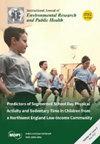Strategies for Coping with Minority Stress among Queer Young Adults: Usage Frequency, Associations with Demographics, and Mental Health
3区 综合性期刊
Q1 Medicine
International Journal of Environmental Research and Public Health
Pub Date : 2024-08-10
DOI:10.3390/ijerph21081052
引用次数: 0
Abstract
Queer young adults report significantly higher levels of anxiety and depression than their heterosexual counterparts, which is linked to sexual minority stress. Therefore, it is important to understand the coping strategies employed by this population to navigate minority stress and how coping strategies may impact mental health outcomes. Drawing from a U.S. national diverse sample of 387 queer young adults (ages 18–39 years), we analyzed descriptive results of 11 behavioral strategies to cope with minority stress and used ordered logistic and linear regression to examine the following objectives: the frequency of the use of each coping strategy, and the associations between each strategy and demographic characteristics as well as depression and anxiety. Results revealed that avoidance and talking with friends were the most frequently utilized coping strategies, while prayer/religious activities and counseling/psychotherapy/support groups were infrequently used. We examined utilization preferences of coping strategies across demographic factors (e.g., assigned sex at birth and sexual orientation). The use of counseling/psychotherapy/support group was positively associated with mental health symptoms, while exercise and mindfulness/mediation were associated with lower mental health symptoms. Our findings provide insights for mental health researchers and professionals in selecting appropriate coping strategies for queer young adults in prevention and intervention efforts.同性恋年轻人应对少数群体压力的策略:使用频率、与人口统计学和心理健康的关系
同性恋青年的焦虑和抑郁程度明显高于异性恋青年,这与性少数群体的压力有关。因此,了解这一人群在应对少数群体压力时所采用的应对策略以及应对策略如何影响心理健康结果非常重要。我们从美国全国 387 名同性恋年轻人(18-39 岁)的不同样本中,分析了应对少数群体压力的 11 种行为策略的描述性结果,并使用有序逻辑回归和线性回归研究了以下目标:每种应对策略的使用频率、每种策略与人口统计学特征以及抑郁和焦虑之间的关联。结果显示,回避和与朋友交谈是最常用的应对策略,而祈祷/宗教活动和咨询/心理治疗/支持小组则很少使用。我们研究了不同人口学因素(如出生时的性别和性取向)对应对策略的使用偏好。咨询/心理治疗/支持小组的使用与心理健康症状呈正相关,而运动和正念/调解则与较低的心理健康症状相关。我们的研究结果为心理健康研究人员和专业人员在预防和干预工作中为同性恋青年选择适当的应对策略提供了启示。
本文章由计算机程序翻译,如有差异,请以英文原文为准。
求助全文
约1分钟内获得全文
求助全文
来源期刊

International Journal of Environmental Research and Public Health
Medicine-Public Health, Environmental and Occupational Health
CiteScore
7.30
自引率
0.00%
发文量
14422
审稿时长
1 months
期刊介绍:
International Journal of Environmental Research and Public Health (IJERPH) (ISSN 1660-4601) is a peer-reviewed scientific journal that publishes original articles, critical reviews, research notes, and short communications in the interdisciplinary area of environmental health sciences and public health. It links several scientific disciplines including biology, biochemistry, biotechnology, cellular and molecular biology, chemistry, computer science, ecology, engineering, epidemiology, genetics, immunology, microbiology, oncology, pathology, pharmacology, and toxicology, in an integrated fashion, to address critical issues related to environmental quality and public health. Therefore, IJERPH focuses on the publication of scientific and technical information on the impacts of natural phenomena and anthropogenic factors on the quality of our environment, the interrelationships between environmental health and the quality of life, as well as the socio-cultural, political, economic, and legal considerations related to environmental stewardship and public health.
The 2018 IJERPH Outstanding Reviewer Award has been launched! This award acknowledge those who have generously dedicated their time to review manuscripts submitted to IJERPH. See full details at http://www.mdpi.com/journal/ijerph/awards.
 求助内容:
求助内容: 应助结果提醒方式:
应助结果提醒方式:


